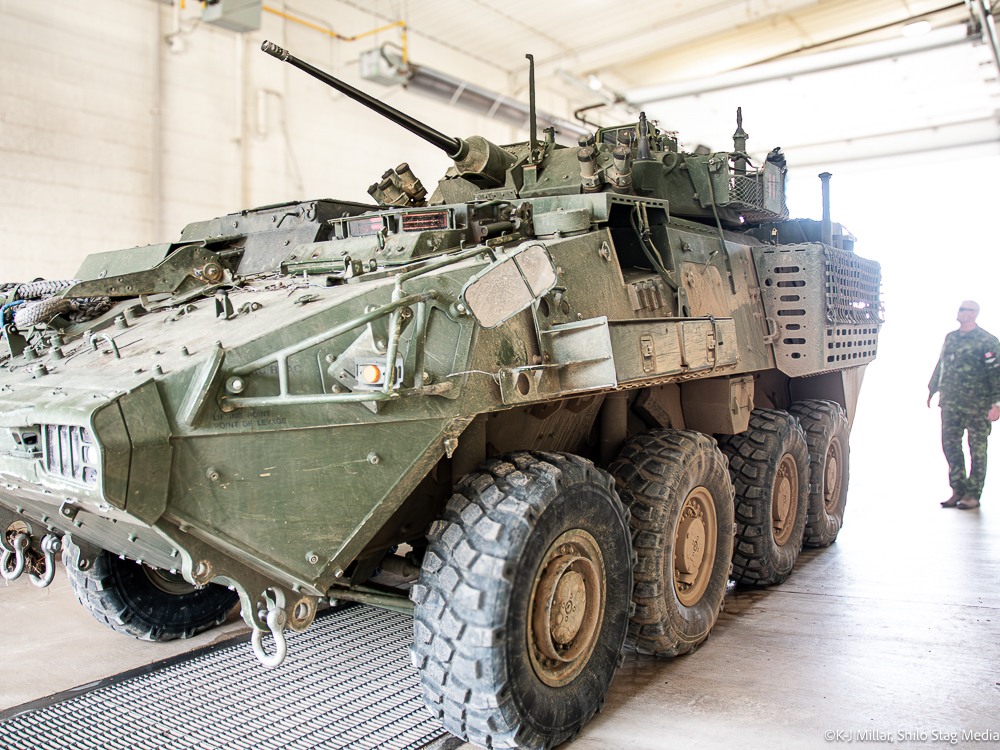
A light armoured vehicle (LAV) sits in the wash bay at CFB Shilo on May 17/ (Photo K-J Millar/Shilo Stag Media)
K-J Millar
Shilo Stag Media
The Canadian Army will receive a new fleet of 1,500 vehicles by 2027, with a $2.58 billion investment for the Logistics Vehicle Modernization (LVM) Project, Minister of National Defence Bill Blair announced on May 29.
Blair also announced an $11.2 billion 25-year contract for the Future Aircrew Training (FAcT) Program. The CAF will acquire more than 70 training aircraft, split into five fleets and based at sites including Portage la Prairie, 402 Squadron at 17 Wing in Winnipeg, and 15 Wing in Moose Jaw, Saskatchewan.
“Today’s investments demonstrate that when we work collaboratively with Canadian industry partners, we can provide our troops with the tools that they need to do their jobs – and support good jobs right across Canada. With these projects, and through our renewed vision for defence, Our North, Strong and Free, we are committed to building an even stronger relationship with industry, founded on transparency and trust,” Blair said.
Under the Logistics Vehicle Modernization (LVM) project more than 1,000 light armoured trucks and 500 heavy trucks, complete with associated equipment such as armoured protection kits, modules, containers, and trailers, will replace the current fleet. The in-use light support vehicles, heavy logistics vehicles and the minor fleet of heavy engineer support vehicles have been in use since the late 1980s.
“The new modern fleet of vehicles will enable the CAF to transport larger loads of personnel, equipment and supplies while providing increased mobility and protection for CAF members,” a Department of National Defence press release states.
Two contracts have been awarded for the LVM project. The first will purchase the new vehicles, related equipment, and initial in-service support. The second will provide long-term in-service 25-year support for the Army fleet.
The LVM project has the potential to create or maintain 1,550 job and contribute $200 million to Canada’s GDP over an eight-year period.
Under the FAcT Program state-of-the-art platforms for training and operations at home and abroad include outfitting the Royal Canadian Air Force (RCAF) with new fleets of:
Grob G120TP,
Pilatus PC-21,
Beechcraft King Air 260,
Airbus Helicopters H-135, and
De Havilland Dash 8-400 is equipped with a mission training system in the cabin.
“The announced investment is part of the largest recapitalization of the RCAF since the Second World War. Since 2022 alone, the Government of Canada has finalized the procurement or upgrade of approximately 140 new aircraft for the RCAF – from F-35 fighters to P-8A Poseidon multi-mission aircraft. This particular investment will bolster our ability to train a sufficient number of qualified aircrews to meet our operational requirements.
The contract will also include classroom instruction, simulator and flight training, as well as numerous on-site support activities for prospective RCAF Pilots, Air Combat Systems Officers, and Airborne Electronic Sensor Operators. Training under this new contract will continue to take place at key RCAF Wings in Saskatchewan and Manitoba, and is expected to begin in spring 2029.
The FAcT Program has the potential to create or maintain 3,400 jobs and contribute $405 million annually into Canada’s gross domestic product over a 25-year period,” the media statement reads.

